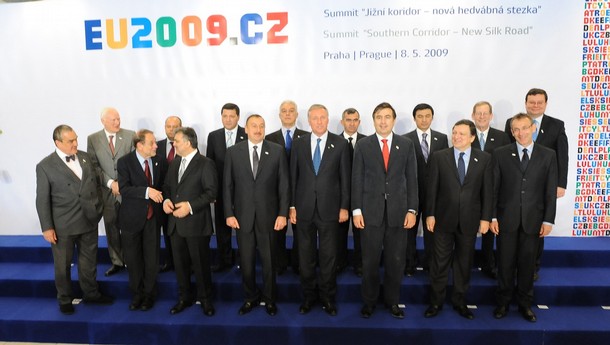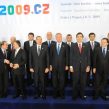
Astana Drifts Away From EU-Favored Energy Projects
Publication: Eurasia Daily Monitor Volume: 6 Issue: 99
By:

Gas and oil supplies to energy-hungry Europe have always featured as the key topic in talks between Astana and EU officials, concerning Kazakhstan’s OSCE chairmanship in 2010. Stifled by the precarious situation in the energy sector, the EU has often ignored the heavy-handedness of the Kazakh authorities in dealing with the opposition press, and has toned down its criticism on the non-compliance of Kazakhstan’s laws with democratic standards. In appreciation of western backing for Kazakhstan’s coveted chairmanship of the OSCE, Astana invariably showed interest in European energy projects.
Speaking at the international economic conference in Astana in October, 2007 President Nursultan Nazarbayev said that Astana sought EU support for efforts to diversify Kazakhstan’s energy routes. In his recent talks in Washington with the U.S. Energy Secretary Steven Chu, Kazakhstan’s Foreign Minister Marat Tazhin prioritized his country’s energy partnership with the United States, particularly in implementing the Nabucco gas pipeline project, which envisages Kazakhstan becoming one of the key regional energy suppliers to Europe (Panorama, May 15).
However, the actual condition of the energy partnership between Kazakhstan and the EU might be subjected to severe testing. The abstention of Kazakhstan, along with Uzbekistan and Turkmenistan, from signing the joint statement on the Nabucco project at the Prague energy summit on May 8, signaled Astana’s waning enthusiasm over EU-generated energy projects. Official sources in Astana stated that Kazakhstan did not sign the statement on the construction of the Nabucco gas pipeline for "economic and geopolitical considerations" (Delovaya Nedeliya, May 15).
In the aftermath of the Prague energy summit, generally considered as a disappointment for the EU in its efforts to secure Central Asian energy suppliers for the Nabucco route by-passing Russia, Nazarbayev endorsed the ratification by parliament of the agreement between Turkmenistan, Russia and Kazakhstan on the construction of the 1,700 kilometer long Caspian gas pipeline. The tripartite agreement signed on December 20, 2007 in Moscow, envisaged completing the Caspian gas pipeline by the end of 2010. The project is intended as an alternative to the much-debated Nabucco pipeline. It was initially agreed that Kazakhstan and Turkmenistan will each annually pump 10 billion cubic meters (bcm) of gas through the Caspian pipeline. But Turkmenistan claimed that it could supply up to 30 bcm. However, many energy experts question Turkmenistan’s capacity to supply such volumes, and they are even more skeptical about Kazakhstan’s capacity to ensure stable gas supplies. Kazakhstan’s Minister of Energy and Mineral Resources Sauat Mynbayev, promised no more than 2 bcm of gas annual deliveries through the Caspian pipeline (Panorama, May 15).
Despite concerted efforts to develop the common pipeline project and set pragmatic goals, each participant has their own motivations and objectives. For Russia the Caspian gas pipeline will keep the Central Asian nations away from the political and economic influence of the EU, and restore Russian domination over the regional energy sector. For Turkmenistan, an unreliable and unpredictable partner of Russia, the Caspian pipeline is the only available alternative to bring its rich energy resources to European markets.
Last April a row erupted between Turkmenistan and Russia after Moscow drastically reduced the shipment of Turkmen gas running through the Srednaya Azia (Central Asia) Soviet-era pipeline network. In response, Ashgabat concluded a preliminary gas delivery agreement with the German RWE AG Company involved in the Nabucco project. Kazakhstan has considerable commercial interests in its territory being used as a transit route for Turkmen gas deliveries to Russia, as it earns up to $1.85 in transit fees for each 1,000 cubic meters of gas transported per 100 kilometers. Kazakhstan has every reason to fear the dramatic reduction of the transit fees if Nabucco is put into operation and Turkmen gas starts to flow through it.
Kazakhstan’s pro-Russian behavior at the Prague summit proved embarrassing, though predictable for the West. At the fourth Energy Summit in Baku last year, Kazakhstan and Turkmenistan reacted in a similar manner -refusing to support the Odessa-Brody oil pipeline and the Nabucco project. Although the Kazakh KazMunaiGaz Oil Company and the Azeri National Oil Company concluded an agreement on oil shipment through the BTC, Kazakhstan has since lost interest in the project. Azeri oil experts recognize that without Turkmen and Kazakh oil, Azerbaijan alone will not be able to ensure the efficient operation of the BTC (Nezavisimaya Gazeta, December 9, 2008).
The EU is also losing ground in the competition for Caspian oil resources. Seen from Astana, the implementation of the long-debated BTC pipeline project is as illusory as the Nabucco project. Kazakhstan pumped its first Tengiz oil into the BTC last October, but 5,000 barrels of Kazakh oil per day barely covers 0.5 percent of the pipeline’s capacity, while the Caspian Pipeline Consortium handles more than 660,000 barrels daily. Kazakhstan’s ministry of energy and mineral resources announced the projected oil output of 100 million tons by 2015. The growing volume of oil output and adequate hydrocarbons transportation routes to Western consumers increasingly compels Kazakhstan to accept conditions set by Moscow.




